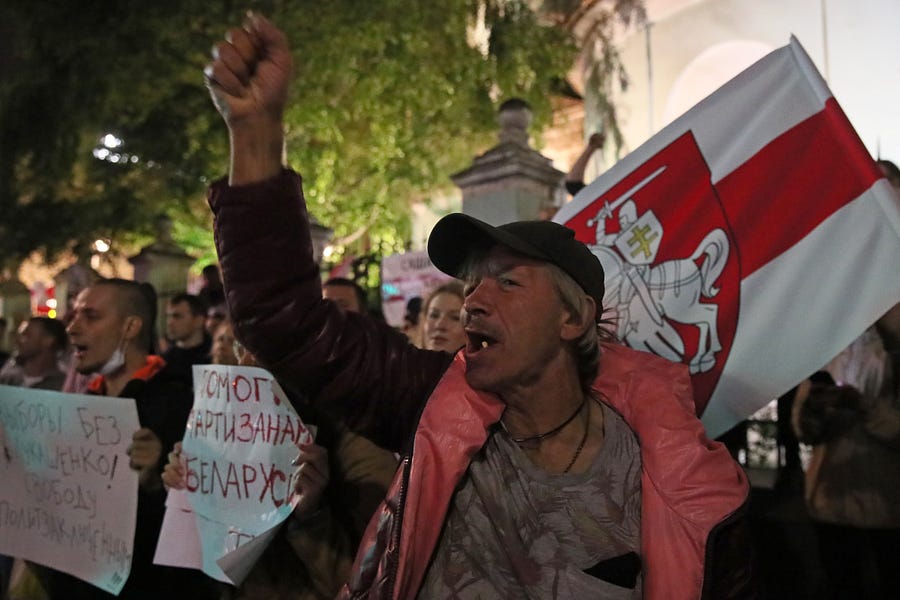Sunday’s elections in Belarus saw the most significant outpouring of civic opposition to the authoritarian Lukashenko regime in years. After suppressing dissent and falsifying results, Alexander Lukashenko is now claiming a landslide victory, determined to maintain this fiction through a brutal crackdown on protesters and political opponents.
However hard he may try, Lukashenko cannot hide the fact that he has clearly lost all legitimacy with the Belarusian people, who have put their faith in opposition challenger (and political novice) Svetlana Tikhanovskaya. At the time of publication, Tikhanovskaya had fled to Lithuania after she was widely reported to have been threatened with arrest and refuses to concede the election. Tikhanovskaya deserves the full support of the international community—and the United States in particular.
The regime did everything in its power to prevent the elections from being free and fair—restricting candidates’ registration and campaigning; manipulating the early voting period to inflate turnout; using the COVID-19 pandemic as an excuse to obstruct independent election monitors; and directing election administration officials to manufacture results out of whole cloth. The fraud was so systematic that many election precincts registered turnout of more than 100 percent. But in fact, all the evidence suggests that Lukashenko has lost the election and can only remain in power by force.
What can the community of democratic nations do to stand with the forces of democratic change inside Belarus?
To begin with, the U.S. and its partners should state unequivocally that the fraudulent nature of this election means that Lukashenko’s presidency is illegitimate. Secretary Pompeo’s denunciation of the government’s conduct is a promising start—but it is vital that the State Department and its counterparts around the world continue to monitor the situation, condemn violent response to peaceful protests, and marshal a concerted diplomatic response to Lukashenko’s clear intention to retain power through violence.
The international community must demand that new elections are held under free and fair conditions. The government must first and foremost release the members of the opposition who were incarcerated during the campaign to prevent them from challenging Lukashenko, including prominent opposition figures Victor Babariko and Sergei Tikhanovsky (Tikhanovskaya’s husband).
In addition, the U.S. and partners should push for the government to register all candidates who meet the required standards to compete in the election; allow both international and domestic election observers to freely observe the elections and help to validate the results; open up the media to an array of diverse opinions; lift the internet shutdown; and cease the violent suppression of protests and freedom of expression. In fact, Lukashenko has a very limited window of opportunity to exercise this option before popular opposition to the regime becomes overwhelming and his position untenable.
Perhaps the most important way the U.S. and its partners can support the Belarusian people in demanding these changes is by backing up calls for free elections with the threat of punitive action against the regime. This should begin with reimposing individual and sectoral sanctions on the officials and entities responsible for human rights violations and manipulating the election. There is precedent for this—after the fraudulent elections and post-election repressions in 2006 and 2010, the U.S. and European Union implemented travel restrictions and targeted financial sanctions on Belarusian state-owned entities and individuals, including Lukashenko himself. With the regime in a far more perilous state today because of the collapsing economy and frustrated populace, such measures could well prove to be a tipping point for Lukashenko and his cronies.
As another way of exerting leverage, the U.S. and EU should withdraw the much-needed financial assistance it has provided to Belarus in recent years (the U.S. alone has given about $50 million since 2014)—with the exception of civil society and non-governmental organizations. As this support was predicated on Belarus cleaning up its record on human rights and democracy issues, it is only logical that the funds should be withdrawn in response to the campaign of abuses unleashed to protect the regime at all costs.
The Belarusian people have shown that they are no longer afraid to express themselves at the ballot box—and the regime knows that a free election would deliver a resounding defeat. Like all authoritarian governments, the Lukashenko regime is most afraid of its own people—a truth that is becoming more and more obvious as it continues its campaign of repression and intimidation.
With a combination of economic strain and civic frustration straining the foundations of the Lukashenko government, the U.S. and its democratic partners have a unique opportunity to pressure the regime to hold free and fair elections and respect the rights of the Belarusian people. This is not only the right thing to do, it is the strategic thing to do—putting authoritarians everywhere on notice that they cannot steal elections without suffering severe consequences.
Stephen Nix is the regional director for Eurasia at the International Republican Institute.
Photograph by Vladimir Gerdo/TASS/Getty Images.






Please note that we at The Dispatch hold ourselves, our work, and our commenters to a higher standard than other places on the internet. We welcome comments that foster genuine debate or discussion—including comments critical of us or our work—but responses that include ad hominem attacks on fellow Dispatch members or are intended to stoke fear and anger may be moderated.
With your membership, you only have the ability to comment on The Morning Dispatch articles. Consider upgrading to join the conversation everywhere.